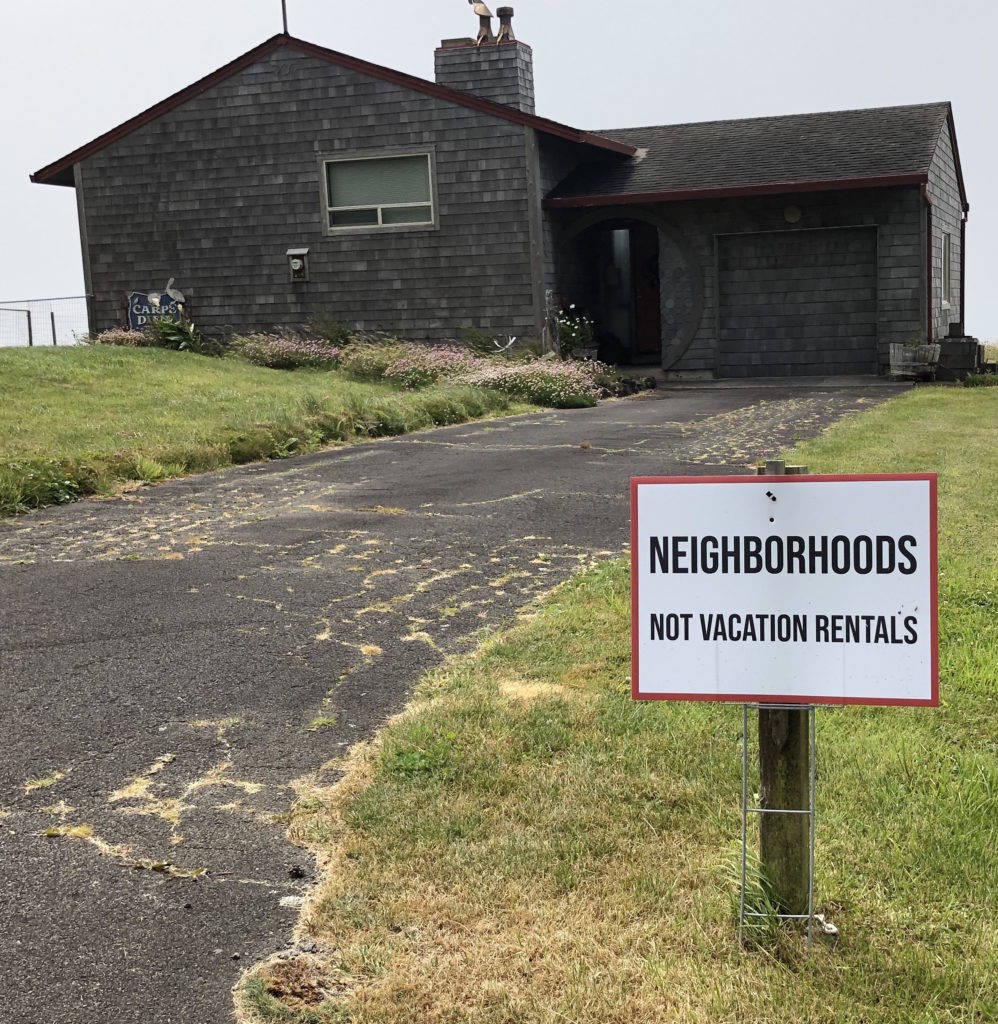
By QUINTON SMITH/YachatsNews.com
NEWPORT — Lincoln County commissioners have re-instituted their moratorium on new vacation rental licenses, and under threat of a lawsuit made the freeze retroactive to Dec. 1 — the date when a circuit court judge issued a temporary restraining order barring the county from enforcing a voter-passed initiative phasing out rentals over five years.
Commissioners held a special, online meeting Friday, Dec. 3 to hear briefly from the county’s attorney, comments from three people, and discuss their options. Commissioners agreed that although they did not like the measure passed by voters — they believed their ordinance approved six days before the election was better — they had little choice but to follow the sentiment of voters. Voters passed Measure 21-203 by a ratio of 58-to-42 percent.

“The voters spoke earlier this month and spoke rather overwhelming …” said Commissioner Claire Hall, who said it was now the county’s obligation to defend the ballot measure and make sure a moratorium continued.
The commission’s action followed a flurry of activity the past 10 days, including:
Wednesday, Nov. 24: Commissioners generally agreed to let their 20-month-old moratorium on issuing new vacation rental licenses expire as scheduled Tuesday, Nov. 30;
Tuesday, Nov. 30: Officially decided to let the county’s moratorium expire at midnight because county Counsel Kristin Yuille said a ban on new vacation rental licenses took effect Nov. 19 when the vote on Measure 21-203 was certified by county Clerk Dana Jenkins;
Tuesday, Nov. 30: Lodging industry group Via Oregon on behalf of four license holders filed a complaint against the county, and asked the Lincoln County Circuit Court to issue a restraining order prohibiting enforcement of the ballot measure;
Wednesday, Dec. 1: Circuit Judge Amanda Benjamin issued an order freezing any county implementation of the measure for 10 days, held an 80-minute hearing Monday, Dec. 6 where lawyers made their arguments. Benjamin said Monday she would make a ruling by the end of the day Friday.
Friday, Dec. 3: Not knowing what the judge may do with the restraining order and not wanting to process new vacation rental licenses, commissioners scheduled a noon meeting to see if they wanted to re-institute the moratorium.
The commissioners’ decision became more contentious because of rental licenses applications filed Thursday after Benjamin issued her restraining order and before the county re-instituted its measure Friday.
Jamie Michel, vice president of Sweet Homes Vacation Getaways, told commissioners the company had submitted applications Thursday on behalf of nine clients in Yachats, Waldport and Seal Rock and that the company “would be harmed” if the commissioners made their moratorium retroactive.
“… we object that today’s action by the board is an emergency, and that the county has followed proper procedure to enact an emergency moratorium,” Michel said. “We also object that the county’s moratorium does not comply with state law. In addition to those objections, if the moratorium is applied retroactively then we object that the county’s action is an ex post facto law in violation of the Oregon Constitution.”
But that drew a retort from Yuille, who said she believed the commissioners’ action was a legal continuation of the county’s moratorium that expired Tuesday.
“Just because you submit an application doesn’t mean you get approval,” she said. “If somebody wants to challenge it, they are free to do so.”
There is one difference between the county’s lapsed moratorium and the one approved Friday. The county’s previous moratorium applied in all unincorporated areas of the county. The ballot measure put on hold by the judge applied to three types of residential zones. So, commissioners Friday made their’s effective in residential zones — technically R1, R1A and R2 zones — and which would allow rental licenses on larger properties, usually east of U.S. Highway 101.
“We need to be as consistent as we can to the ballot measure,” said Commissioner Doug Hunt.
The new moratorium is effective through March 3, but commissioners said depending on court action and other developments they could always adjust it.
“Clearly there will be other court actions and we don’t know how short term rentals will be legally managed,” Hunt said.



